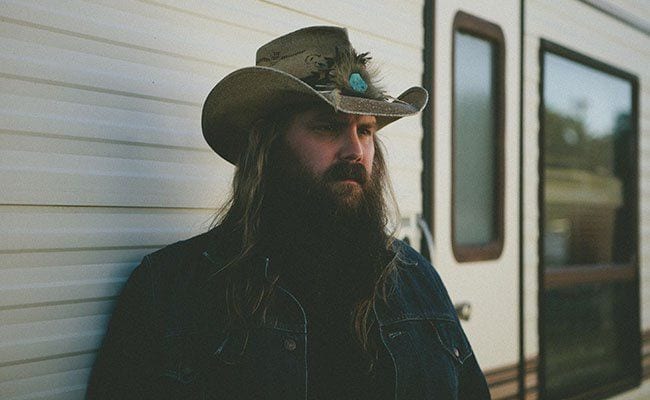
A few years ago, Jason Isbell, Sturgill Simpson, and Chris Stapleton were hailed as the saviors of contemporary country music, rescuing the genre from stereotypes of revving Chevys and cracking open a cold one with the boys. These Southern troubadours had resuscitated 1970s-era country — “real” country, critics would say. Using country’s traditional storytelling mode, Isbell wrote grim realist narratives about alcoholism and disease on his breakout album, Southeastern. Simpson modernized a Waylon Jennings brand of country, but remained skeptical about country’s core values on Metamodern Sounds in Country Music.
Stapleton brought this twangy uprising into the mainstream with Traveller. With a croon as smooth as “Tennessee Whiskey”, as warm as “a glass of brandy”, and with enough bite to boot, Stapleton won over audiences with his blend of vocal power and soul. He combined his Southern outlaw persona with soul phrasing and the pop sensibility he developed in co-writing projects with Ashley Monroe and Adele.
With follow-ups Something More Than Free and A Sailor’s Guide to Earth, Isbell and Simpson skirted their savior personas. Rather than digging out of rock bottom, Isbell embraced his new domestic role as husband and father. His character studies became less renegade than mature, and the music’s tighter focus and cleaner instrumentation reflected that transformation. Instead of sounding like a “metamodern” Jennings, Simpson introduced aspects of R&B and funk to his musical repertoire, pushing the boundaries of country altogether.
Although Stapleton might possess the most crossover appeal of the three — after all, he swept the Country Music Awards like a bearded Adele in blue jeans — he follows Isbell and Simpson in side-stepping expectations with his latest release, From a Room: Volume 1. Rather than pandering to mainstream audiences with a single-filled record of country bruisers, Stapleton distils his debut’s key ingredients. His move is more Isbell than Simpson. But it’s still Stapleton to the core.
In stripping down its instrumentation and song structures, From a Room lays bare the essential element of Stapleton’s music — his voice. The album’s leanness makes his howls all the more beefy, and his scaled back balladeering all the more poignant. Its brevity — only 32 minutes long — highlights each moment, whether the emotional harmonies in his cover of Willie Nelson’s “Last Thing I Needed, First Thing in the Morning”, or the turns of phrase in “Broken Halos”, even more. Stapleton gives his vocals and songwriting roots space to grow.
The album’s centerpiece is a triptych of songs about the difficulties of love. Although musically uncomplicated, “Either Way”, “I Was Wrong”, and “Without Your Love” find complexity in their narratives about complicated relationships, with Stapleton’s bellow pushing into the red with each mounting distress. “Either Way”, originally written for Lee Ann Womack, is a moving ballad set to a single acoustic guitar. Moving from defeated whispers to calloused wails, the song details a broken marriage: “We can’t just go on like this/ Say the word, we’ll call it quits/ Baby, you can go, or you can stay/ But I won’t love you either way.”
Over a smooth mid-tempo groove, “I Was Wrong” reneges on Stapleton’s position in “Either Way”. With hearty vocal runs in the chorus that would make any blues singer envious, Stapleton indicates that he’s still in love after all. Desperately, he pounds his voice into a syncopated rhythm, scraping some of the song’s polish to great effect: “I don’t know why I told you that I didn’t need you / Can’t you see that, baby, I was wrong.”
Completing this triptych, “Without Your Love” deepens Stapleton’s anguish. “Without your love,” he sings, enhanced by his wife’s harmonies, “Every hour is the darkest time of day / And every moment’s a crime.” As they sing together, the song’s characters drift further apart, stirring the song’s emotional simmer into a boil.
Stapleton follows this anguish with the levity of “Them Stems”, a humorous bluesy romp about having smoked up his stash. Live, the song will almost certainly induce joyous whoops from stoners in the audience. Also generating these drunken bellers will be the earlier “Up to No Good Livin'”, a pedal steel honkytonk about a “Picasso of paintin’ the town.” Outlaw country to the bone, the song sways with the type of booze-drenched heartache you’d find on a Whitey Morgan record.
The volume ends with the haunting murder ballad, “Death Row.” “Death Row” grinds a slow John Lee Hooker-like riff, caked with prison cell grime. This riff gives Stapleton space to wage a war between his gruff vocals and his muddied guitar, each going blow for blow. He rounds out the album with painful wails: “Got a calendar on my wall / Marking the days till I get the call / Till it’s time for me to go / Death Row.”
Altogether, From a Room provides a counterpoint to the Southern outlaw meets Nashville hit machine artistry that some might have expected Stapleton to embrace. Although this album likely won’t sweep the CMAs as Traveller did, its refined craftsmanship hammers home Stapleton’s abilities as a singer and songwriter. In the same way that “Without Your Love” magnifies every moment into a “crime”, From a Room transforms every moment — a vocal run here, a guitar lick there — into something much bigger, raising anticipation even higher for Volume 2.

